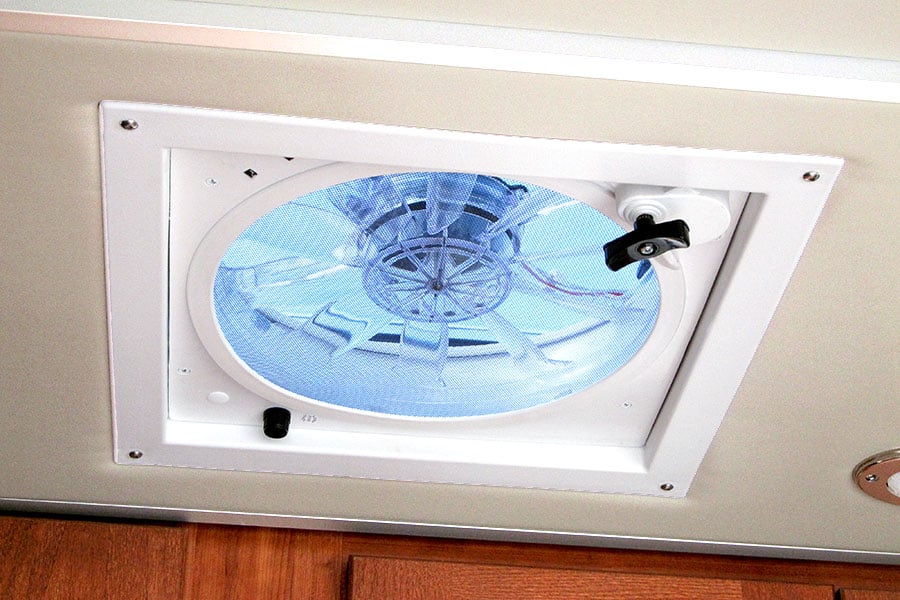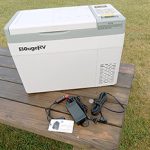
If you want to travel the country or go camping but can’t afford an RV, or don’t want to drive a big vehicle, a van is a perfect compromise.
However, one of the problems that often happens with a camper van is condensation. If it gets serious, it might start to drip on you or make it harder to fall and stay asleep. In a worst-case scenario, the humidity can lead to mold.
How do you stop condensation in a camper van? There are many ways to prevent condensation in a camper van. Some of these options might work better than others, so it’s worth trying a few to see what works best for a particular van.
Ensure there’s proper ventilation
Use a ventilation fan
Install a vapor barrier
Use a diesel heater
Cover exposed metal
The best method to stop condensation when sleeping in a camper van may depend on your location, the size of your van, or other factors. If you want to solve the problem of condensation, you may have to try multiple options before you find the right one for you. The good news is that there are tons of things you can try.
1. Don’t Hang Wet Clothes
The first thing you can do to stop condensation from developing is not to hang or dry wet clothes or other fabrics inside. When wet clothes dry, the moisture will go into the air and thus into the air of your van. Instead, find another way to dry your clothing, towels, and other fabrics.
- If you have a campsite or other place to park your van, set up a clothesline outside, that way, the moisture can circulate freely, and your van can stay dry.
- When you’re on the road, consider using a dryer at a local laundromat. You will have to pay to use the machine, but that will save you the stress of unnecessary condensation.
- You may be able to add something to the exterior of your van to hang clothing. You can purchase clotheslines specifically made for campers.
- If you’re in a wet or rainy place, make sure you use an umbrella so that your clothes don’t get wet. You can easily shake out an umbrella once the rain stops.
While it can be tempting to hang your clothes to dry inside your camper van, doing so could cause condensation. Hanging your clothing overnight can be an excellent way to dry them quickly and cheaply, but the risks aren’t always worth it. Instead, find somewhere outside to dry your clothes so that you can enjoy a dry night of sleep.
2. Clean And Dry Your Van
Before you go to bed each night, make sure your van is clean and dry on the inside. If you had any messes during the day, clean those up. Leaving messes, especially somewhat wet messes, could lead to a bit of condensation in the van.
So even if the spill is just water, grab some paper towels and dry up any excess moisture. Retrace your steps for that day so that you clean and dry any spots where water could have spilled or otherwise might be wet. Make cleaning and drying the inside of your van a regular part of your evening routine.
The more you do it, the less you will have to worry about condensation. Cleaning frequently will also help you keep from collecting dirt or developing other problems. It may take some getting used to, but it’s especially crucial to dry your space if you live in a humid or wet climate.
3. Maintain Good Ventilation
Another essential step to stopping condensation when sleeping in a van is to have proper ventilation. The more that air can circulate within your van, the less likely condensation will develop and stay in one place. When air can move, the water molecules will move with it, thus decreasing the chances that they’ll stay and turn into condensation.
- Provided that it’s not raining or storming outside, open one or more windows a bit to let the airflow in and out. If you are worried about rain getting in, contact your dealership to see what kind of rain guards are available for side windows.
- If you notice the condensation is in one part of your van, you can open windows near the problem spot to help isolate the problem.
- While you’re at a campsite or other destination, open the door to your van so that air can come and go even more easily. Of course, you don’t want to let bugs in, but opening the van door can keep things ventilated even more than windows.
Unfortunately, it can be hard to maintain proper ventilation at times. Whether you’re camping in the winter or during some rain, you may not always want to open windows or doors. Still ventilating what you can will help reduce or even stop condensation while you sleep at night.
Other Posts of Interest
- Amazing Places To Camp In The Finger Lakes Region Of New York
- Van Camping vs. Truck Camping: What’s the Difference?
- Camping With Blankets Instead Of Sleeping Bags: Here’s How
4. Use A Ventilation Fan
If you can’t or don’t want to open a window or a door, you can still help with airflow in your van. When you don’t want to use other forms of ventilation, you can use a special fan. These ventilation fans are easy to set up and use, and they can be great for smaller vans or vans with more people.
A ventilation fan causes a slight change in the air pressure inside the van as it changes the temperature. The change in air pressure helps the air circulate more than it would if you didn’t use a fan. A fan of any kind is even better when you’re in the middle of summer and suffering from both extreme heat and condensation.
Ventilation fans don’t have to be big or expensive, and many of them don’t require a ton of power. You can turn it on and let it run during the evening to help keep the air moving as you sleep. The good thing about a ventilation fan is you don’t have to worry about outside conditions to use it.
You can purchase and install, or have installed, ceiling vents, which come in a wide range of prices. This is an inexpensive model that fits most vans and is easy to install.
If you don’t have a ventilation fan installed, you can also find some inexpensive fans that you attach to a window to pull air out. A fan that you plug into your cigarette lighter works also. While typical fans may not be as effective, they can at least help with the temperature and overall airflow. If you decide you like the idea of a fan, you can get a ventilation fan later on.
5. Install A Vapor Barrier
A great way to stop condensation in a van is to install a vapor barrier. Unfortunately, this method requires that you rehaul your current camper van.
- If you have a new van or want to redo the inside of your van, you can add a vapor barrier to the warm side of the insulation.
- A vapor barrier will help keep moisture out of your van, which can be helpful if you frequently travel to rainy or humid places.
- Vapor barriers can also keep moisture from turning into condensation on the inside of your van.
Vapor barriers aren’t a good option when the inside of your van is already finished. However, they are something to consider for future van overhauls. If you decide to install one, it can be a great tool for keeping moisture and condensation from developing while you sleep.
6. Cover While You Cook
If you live in your van full-time, odds are you’ve probably done some cooking or food prep in there. While living in a van can give you more control over when and how you live, it does have some limitations. For example, you may not want to cook the same way as you would in a traditional house or apartment.
In a larger or regular-size home, you can cook in whatever way you choose without stress. You probably have access to a microwave, stovetop, and an oven. However, even if your van has all of those appliances, you may need to rethink your cooking strategy.
For example, cooking pasta in a house or apartment is easy. Once the water boils, you can pour in the pasta and let it simmer. While you can cook pasta in a van, the boiling water will have some water vapor that can turn into condensation.
That’s why it’s not a bad idea to switch to cooking methods that keep food contained. Instead of cooking something on the stove, try baking it in an oven or crockpot. Then, you can keep the food and any water within an enclosed space so that it doesn’t move throughout your van.
While you may need to cook certain foods uncovered, try to cover when you can. That will help keep the water from getting into the air. You can also use outdoor cooking methods, like camping stoves, so that you don’t have to prepare food in your van at all.
7. Keep It Warm
One of the best ways to stop condensation when sleeping in a van is to keep your van warm. When water molecules cool down enough, they tend to condense. This happens most often at night when the temperature drops.
- You don’t have to keep your van super hot, but make sure it’s not too cold.
- Find a comfortable temperature where you can fall and stay asleep.
- You may need to experiment with the exact temperature, and that temperature could change from place to place or season to season.
- There’s no need to keep it warm during the day, but make sure that you turn up the heat in the evening so that there’s time for the temperature to reach what it should be.
- If you’re worried about being too hot to sleep, consider using multiple thinner blankets instead of one thick one. That way, you can add or get rid of layers as needed.
While keeping the temperature up within your van may not completely stop the condensation, it can help. There are multiple types of heaters you can use to maintain a warmer temperature, from the van itself to a separate heater. If you have trouble maintaining a warm van, a heater can come in handy.
8. Use A Diesel Heater
One excellent type of heater to stop condensation in a van is a diesel heater. As the name suggests, these heaters use diesel fuel for power so that they can heat your van. They are designed specifically for vehicles, and they can provide heat consistently.
Diesel heaters use surrounding air, and they mix the air with the diesel fuel. That mixture then heats the air so that it can warm up you and the inside of your van. A diesel heater is easy to set up and just as easy to use.
These heaters are safe and quiet, so you don’t have to worry about noise interrupting your sleep. They will shut down if they sense that the temperature is too hot for safe operation, which can help keep you from overheating. And if you drive your van in cold weather, a diesel fan can keep your windows from icing over, which means you can get on the road quicker.
Diesel heaters are great throughout the year, and you don’t have to be in a cold place to get the most out of using one. If you want to know more about how diesel heaters work, click here. A great choice is the VVKB Apollo-V2 Diesel Air Heater.
9. Get A Dehumidifier
Whenever you were sick as a kid, your parents probably brought out the family humidifier. Humidifiers can be great for clearing stuffy noses and making you feel better, but they’re the opposite of what you want when you have condensation. Instead, you should get a dehumidifier.
A dehumidifier is similar to a humidifier in that it helps control the level of humidity in your room or van. However, dehumidifiers help lower the humidity while humidifiers increase it. Not only should you choose a dehumidifier for your van, but you should avoid humidifiers.
When you live in a van and have condensation problems, you want to keep the interior as dry as possible. While some moisture can be helpful, you don’t want too much of a good thing. If you need some humidity, at least consider using a dehumidifier during the colder months when condensation can be worse.
10. Cover Exposed Metal
When possible, try to cover any exposed metal in the interior of your van. As the metal cools down and as the temperature changes, condensation can collect on the metal. While condensation can show up anywhere, it has nowhere to go on metal.
Unlike your clothing or other fabric, metal won’t absorb any condensation. This means that it will just sit there until you wipe it off or until the temperature becomes stable. You can use fabric to cover the metal in a pinch, or you can look into more long-term options, such as wool insulation. To learn more about wool insulation, read our post “Is Sheep Wool Insulation Safe?“
While some exposed metal is fine, and sometimes necessary, you want to minimize that. The less metal that is exposed to condensation, the less it will develop.
11. Determine If There’s A Leak
If you try everything you can think of and you still have condensation in your van, you may have a leak. A leak can be especially likely if you find that condensation is more prominent in one part of your van. Look for leaks in different places, on the ceiling, in a corner or on a wall.
If you can’t find a leak anywhere, you may need to take your van to a professional. A second set of eyes might find a problem that you easily overlooked. Professionals can also help fix the problem if there is a leak, which means you can get back to living in your van and getting a good night’s sleep.
Why Stop Condensation
A bit of condensation here or there might not seem like a pressing issue, but before it gets worse, you will want to stop it.
Condensation can be annoying, especially if it drips on you or if you wake up feeling wet and gross. However, it can also cause damage to your van and your belongings. If you can’t stop the condensation, you should at least try to minimize it.
Even if you haven’t experienced much condensation when sleeping in your van, it could develop, especially if you like to travel to different climates, some areas could have more condensation than others. Knowing how to stop the condensation now will not only help you fix the current situation, but you can also prevent future condensation problems.
Final Thoughts On Condensation
Life in a camper van can be amazing, but that’s not the case when condensation makes it hard for you to sleep. Luckily, there are multiple ways you can stop condensation when sleeping in a van. Give one or more of them a try, and odds are you will be able to prevent or at least reduce the condensation in your camper van.





